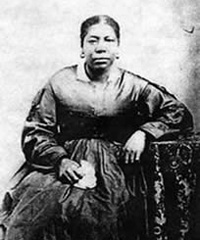| Part of a series on |
| Forced labour and slavery |
|---|
 |
| Black people and the Latter Day Saint movement |
|---|
 |
The Latter Day Saint movement has had varying and conflicting teachings on slavery. Early converts were initially from the Northern United States and opposed slavery,[1] believing that their opposition was supported by Mormon scripture.[2] After the church base moved to the slave state of Missouri and gained Southern converts, church leaders began to enslave people.[3] New scriptures instructing Latter-Day Saints not to intervene in the lives of the enslaved people were revealed.[4] A few enslavers joined the church, and when they moved to Nauvoo, Illinois, they illegally took their enslaved people with them, even though Illinois was a free state.[5]
After Joseph Smith's death, the church split. The largest contingent followed Brigham Young, who stated that he was "neither an abolitionist nor a pro-slavery man." He allowed enslaved men and women to be brought to the territory but prohibited the enslavement of their descendants and required their consent before their owners could move them.[6] Young established the Church of Jesus Christ of Latter-day Saints (LDS Church). A smaller contingent followed Joseph Smith III, who opposed slavery[7] and established the Reorganized Church of Jesus Christ of Latter Day Saints (RLDS). Young brought his followers to Utah, where he led efforts to legalize slavery in the Utah Territory.[8] Brigham Young taught his followers that slavery was ordained by God and that efforts to abolish it were contrary to the decrees of God and would eventually fail.[9][10][11] He also encouraged members to participate in the enslavement of Native Americans.[12][13][14]
- ^ Cite error: The named reference
CivilWarMissouriwas invoked but never defined (see the help page). - ^ "Brigham Young: We Must Believe in Slavery (23 January 1852)". March 6, 2014.
- ^ Cite error: The named reference
SmithHamwas invoked but never defined (see the help page). - ^ D&C Section 134:12
- ^ Flake, Joel. "Green Flake: His Life and Legacy" (1999) [Textual Record]. Americana Collection, Box: BX 8670.1 .F5992f 1999, p. 8. Provo, Utah: L. Tom Perry Special Collections, Brigham Young University.
- ^ Cite error: The named reference
Journal of Discourses 10was invoked but never defined (see the help page). - ^ Cite error: The named reference
launiusrwas invoked but never defined (see the help page). - ^ Cite error: The named reference
Young Jan 5was invoked but never defined (see the help page). - ^ Nichols, Jeffrey D. (April 20, 2016). "Slavery in Utah". Utah State Department of Cultural & Community Engagement.
Brigham Young tacitly supported slaveholding, declaring that, although Utah was not suited for slavery, the practice of slavery was ordained by God.
- ^ Taylor, Quintard (May 17, 1999). In Search of the Racial Frontier: African Americans in the American West 1528-1990. New York City: W.W. Norton & Company, Inc. p. 73. ISBN 9780393318890.
Brigham Young spoke for many Saints in 1863 when he assessed the Civil War raging in the East: 'One portion of the country wish [sic] to raise their ... black slaves and the other wish [sic] to free them, and apparently to almost worship them.... Who cares? ... Ham will continue to be the servant of servants, as the Lord has decreed, until the curse is removed.'
- ^ Young, Brigham (1863). . p. 250 – via Wikisource.
- ^ Campbell, Eugene E. (1988), "Chapter 6: The Mormons and the Indians—Ideals versus Realities", Establishing Zion: The Mormon Church in the American West, 1847–1869, Salt Lake City, Utah: Signature Books, p. 107, ISBN 0-941214-62-1, OCLC 17261802, archived from the original on February 9, 2022
- ^ Blakemore, Erin (November 14, 2018). "Mormons Tried to Stop Native Child Slavery in Utah. They Ended Up Encouraging It". The History Channel. A&E Television Networks, LLC.
- ^ Cite error: The named reference
Greenwas invoked but never defined (see the help page).